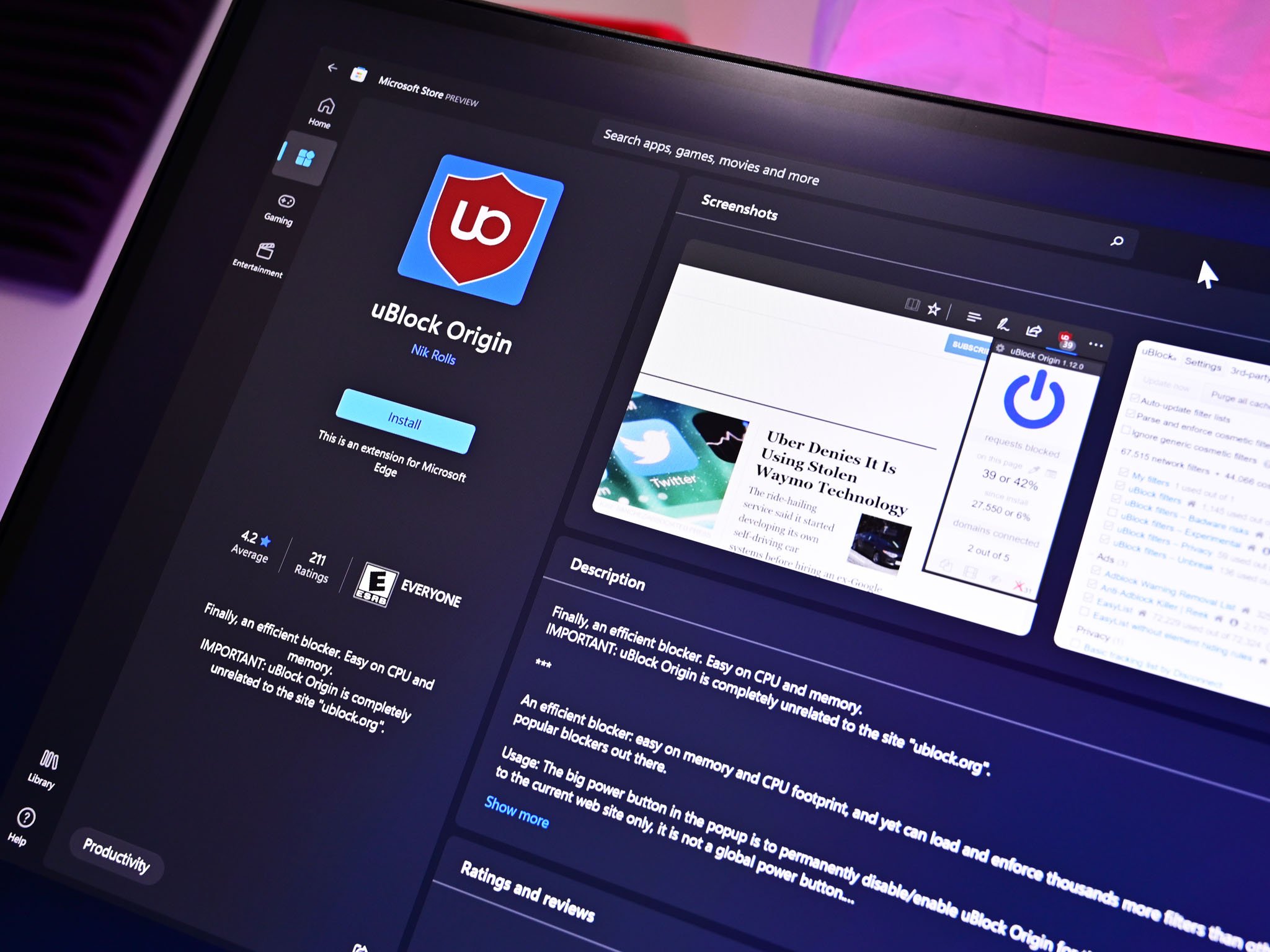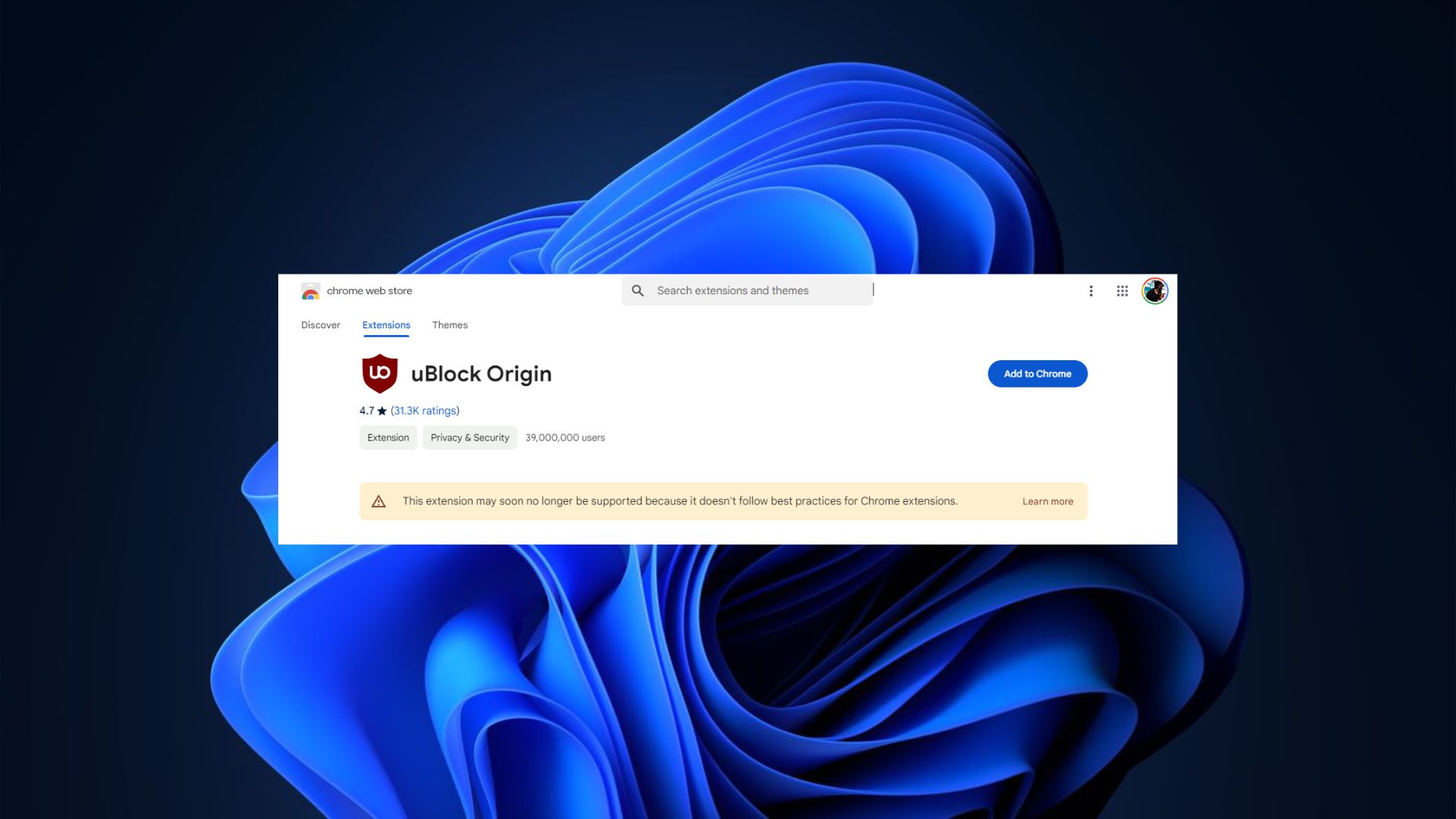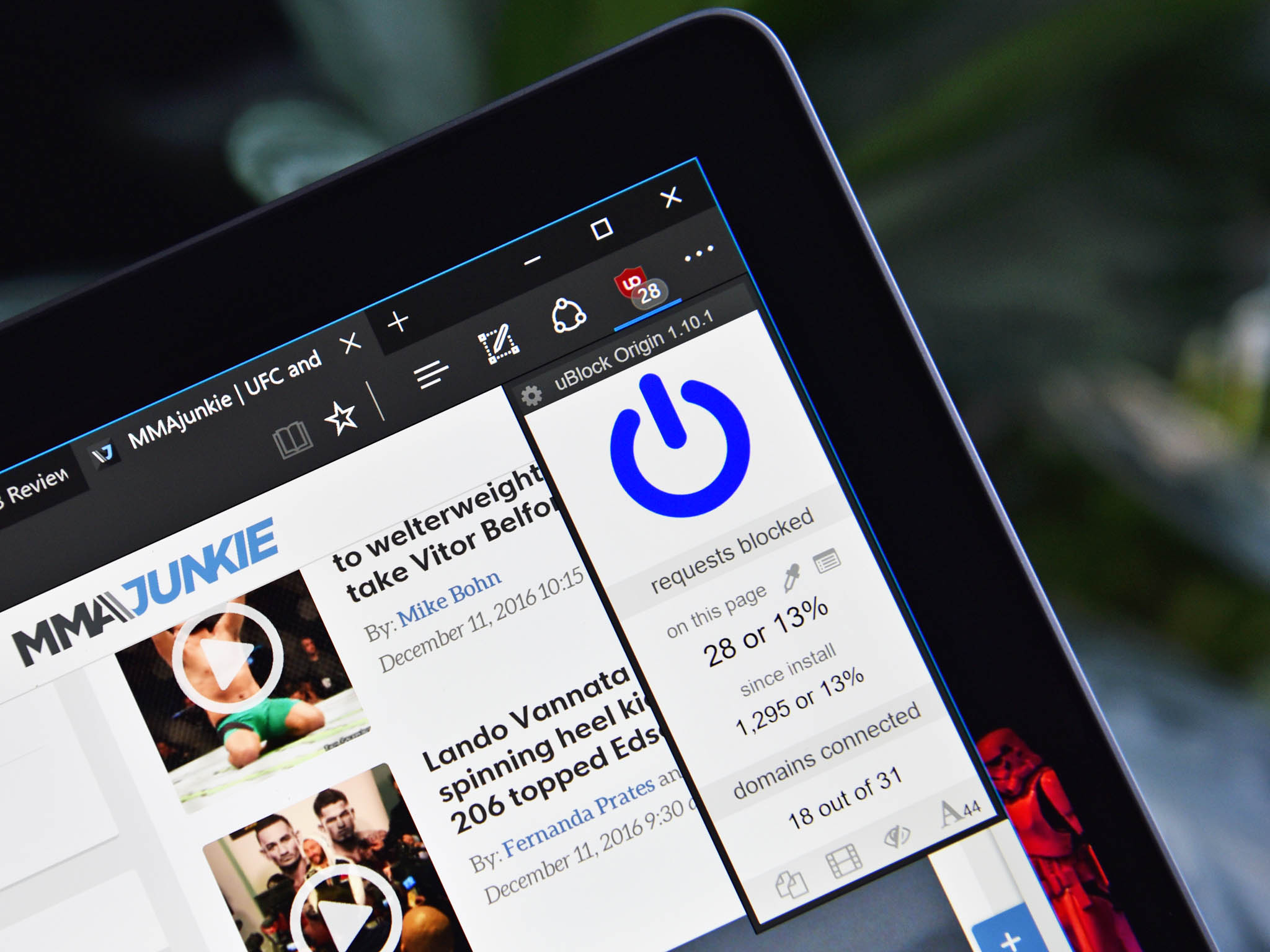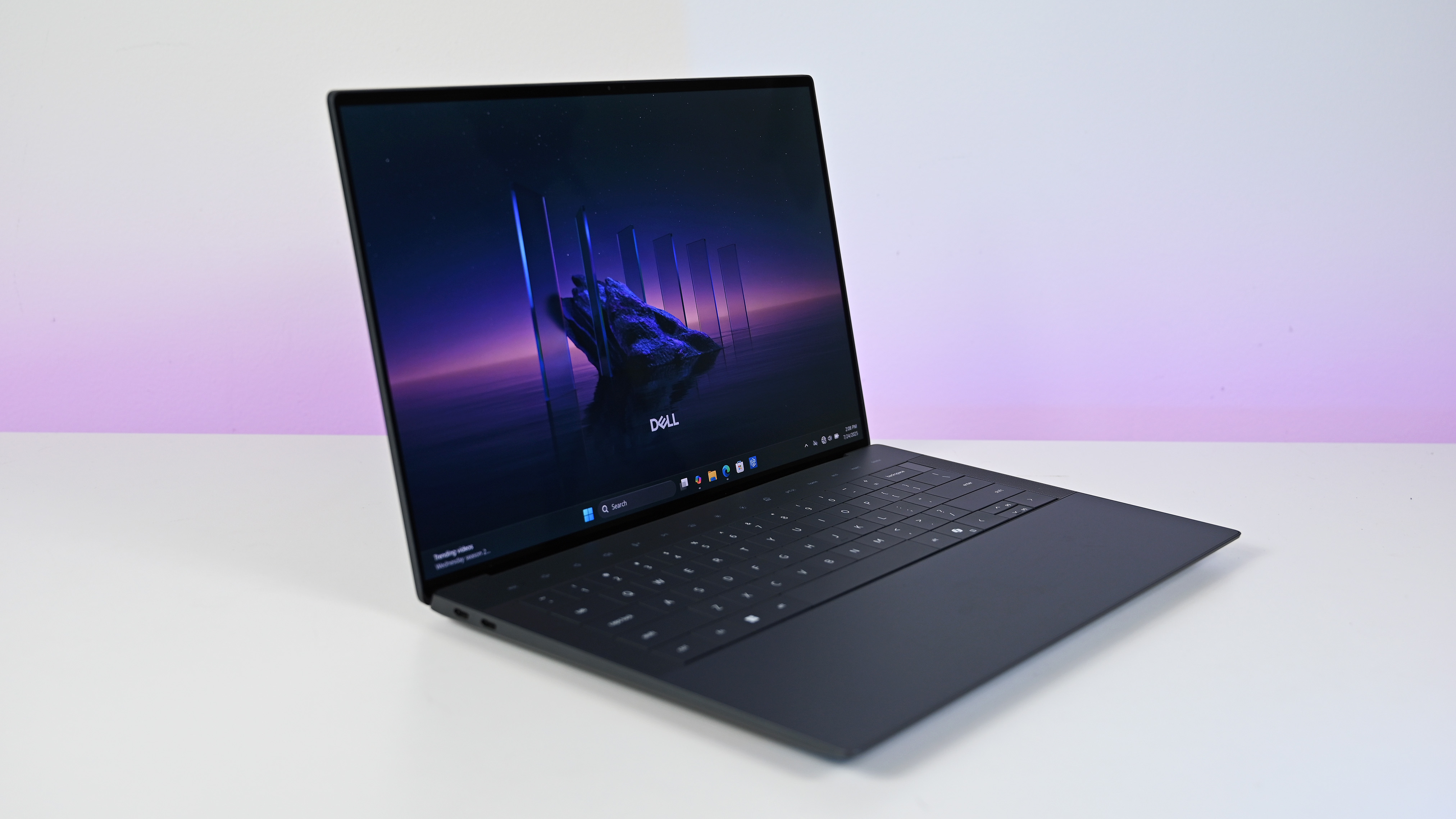Google warns it will end support for uBlock Origin soon "because it doesn't follow best practices for Chrome extensions" — leaving over 30 million users susceptible to intrusive ads
Google will pull the plug on uBlock Origin soon.

What you need to know
- Google announced the transition of its extension support from the Manifest V2 framework to V3 for an enhanced privacy and security user experience.
- Consequently, Google Chrome will no longer support extensions like uBlock Origin running the Manifest V2 framework, leaving over 30 million users susceptible to annoying ads.
- Google has seemingly started issuing warnings about the imminent transition via its Chrome Web Store, potentially indicating it's making the change soon.
UPDATED 16/10/2024: This article has been updated to include a statement from Google regarding its transition from the Manifest V2 framework to Manifest V3.
In August, Google announced its plan to end support for the Manifest V2 framework on Google Chrome and transition its extension support to the new Manifest V3 framework.
As you may know, the deprecation of the Manifest V2 framework means Google Chrome users won't be able to use the uBlock Origin ad blocker and other extensions because they don't meet the threshold. This could potentially leave over 30 million Chrome users susceptible to intrusive ads.
According to Google, the Manifest V2 framework "presents security risks by allowing unreviewed code to be executed in extensions." In contrast, Manifest V3 only allows an extension to execute JavaScript as part of its package, ultimately mitigating the risk.
Despite the frustrations highlighted by users about the change across social media, Google is seemingly moving forward with its plan to deprecate Manifest V2. Users still running the uBlock Origin ad blocker and other extensions with the Manifest V2 framework have reportedly started receiving warnings about the change through Google's Chrome Web Store (via Bleeping Computer):
"This extension may soon no longer be supported because it doesn't follow best practices for Chrome extensions."
it’s happening pic.twitter.com/K3J8Slag3gOctober 12, 2024
Google explains that the move protects users' privacy and security. As such, "Chrome and the Chrome Web Store require extensions to be up-to-date with new requirements." Consequently, Google states it'll disable extensions that don't meet the Manifest V3 framework threshold.
According to Google spokesman Scott Westover:
All the latest news, reviews, and guides for Windows and Xbox diehards.
"Now, over 93% of actively maintained extensions in the Chrome Web Store are running Manifest V3, and the top content filtering extensions all have Manifest V3 versions available - with options for users of AdBlock, Adblock Plus, uBlock Origin and AdGuard."
Windows Central can corroborate the reports about Google sharing a warning message highlighting its plan to cut support for uBlock Origin and other extensions running the Manifest V2 framework "because it doesn't follow best practices for Chrome extensions."
🎃The best early Black Friday deals🦃
- 📺LG Curved OLED Monitor (32-inches) | $803.54 at Amazon (Save $721!)
- 💻Dell XPS 16 (RTX 4070) | $2,399.99 at Dell (Save $950!)
- 🔊2.1ch Soundbar for TVs & Monitors | $36.99 at Walmart (Save $63!)
- 💻Dell G16 Gaming Laptop (RTX 4070) | $1,299.99 at Dell (Save $450!)
- 📺LG C4 OLED 4K TV (42-inches) | $949.99 at Best Buy (Save $450!)
- 💻Samsung Galaxy Book4 Edge (X Elite) | $849.99 at Best Buy (Save $500!)
- 💾SK hynix SSD Thumbdrive (1TB) | $62.99 at Newegg (Save $27!)
- 💻Dell XPS 13 (X Elite) | $999.99 at Best Buy (Save $500!)
- 💻HP Envy 2-in-1 14 (Ryzen 7) | $599.99 at Best Buy (Save $400!)
- 💾Seagate Xbox Expansion Card (1TB) | $149.99 at Best Buy (Save $50!)
There's Lite at the end of uBlock Origin's tunnel
Following Google's official announcement on the transition of its extension support to the Manifest V3 framework for better security and privacy and the warning messages on the Chrome Web Store, the company is likely to deprecate support for Manifest V2 via a future update. While the official date for the transition remains unknown, the change might happen in the coming months.
Google has been blatantly ramping up its campaign against ad blockers across its services, including YouTube. What does this mean for the future of uBlock Origin? Interestingly, the company has since released a new app that meets the Manifest V3 threshold, dubbed uBlock Origin Lite.
RELATED: How to extend uBlock Origin's support in Google Chrome and Microsoft Edge for one year
While uBlock Origin Lite shares core ad-blocking features to its predecessor, it falls short in key departments. For instance, the new app doesn't support dynamic filters for blocking scriptlet injection. The limitations can be attributed to high-level security and privacy clearance that ship with the Manifest V3 framework.
It'll be interesting to see how Google's decision to deprecate the Manifest V2 framework for V3 will impact Google Chrome's dominant market share compared to other browsers. The change has prompted some users to transition to other browsers that support the OG uBlock Origin, including Firefox and Brave.

Kevin Okemwa is a seasoned tech journalist based in Nairobi, Kenya with lots of experience covering the latest trends and developments in the industry at Windows Central. With a passion for innovation and a keen eye for detail, he has written for leading publications such as OnMSFT, MakeUseOf, and Windows Report, providing insightful analysis and breaking news on everything revolving around the Microsoft ecosystem. While AFK and not busy following the ever-emerging trends in tech, you can find him exploring the world or listening to music.


